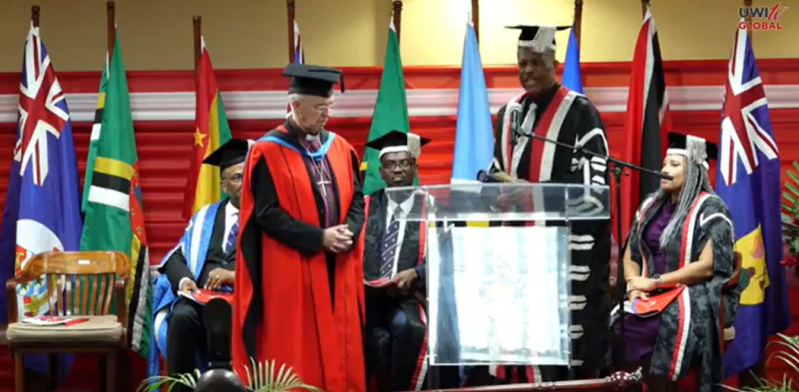
The Most Rev. Justin Welby, Archbishop of Canterbury, received an honorary Doctor of Laws (LLD) degree from The University of the West Indies (UWI) in Kingston, Jamaica on July 20 in recognition for his role in speaking out publicly for the Anglican church to face up to its past role in the transatlantic slave trade.
The doctorate ceremony took place at the E. Nigel Harris Council Room at the UWI Regional Headquarters in Kingston during the archbishop’s visit to the island from July 18 to July 21, in celebration of the 200th anniversary of the establishment of the Diocese of Jamaica and The Cayman Islands.
A press statement by UWI said the Anglican church had been first established and controlled by a local governing class of planters and owners of enslaved people.
“He has spoken and written about the church facing up to its past,” read the UWI statement. “He has called for affirmative action that seeks to address slavery as a crime against humanity. Importantly, he is an advocate of the need for promoting healing, empowerment, and reconciliation.”
Welby took part in a panel discussion at the university about the legacy of enslavement and reparatory justice during his visit.
Fellow panelists included Professor Verene Shepherd, vice chair of the United Nations Committee on the Elimination of Racial Discrimination, former International Court of Justice, Judge Patrick Robinson and the historian, Prof. Patrick Bryan.
Church Commissioners for England created a Healing, Justice and Repair Fund in 2023 after publishing a report on the church’s links to African chattel enslavement and the Archbishop discussed future plans for the fund in a question and answers session.
Welby later spoke about the evils of slavery in his sermon in Kingston’s National Arena, for the final commemorative service for the 200th anniversary on July 21. Gospel readings happened in both Jamaican Patois and English.
Welby acknowledged the “act of grace and forgiveness” in being invited to the island despite the knowledge that the Church of England, and even former Archbishop of Canterbury Thomas Secker [died 1768], owned slaves.
“The shepherds, as Ezekiel says, consumed the flock. It is no wonder that the Church of England has suffered judgment for that,” said Welby in his sermon.
“For what worse thing could be done. And even for those in the church who did not actively participate in transatlantic chattel enslavement, the silence of the Church of England was a collusion, an agreement with slavery. The votes of the bishops in parliament were a support for slavery and their receiving of compensation for freeing the slaves was a profit from slavery.”
Welby called the past wrongs “a vile and disgusting sin” but called out resistance by some people to the Church of England setting aside some money for reparations.
“Yet even today, when the Church of England puts aside a little of its gains, so that the future may be helped to be better than the past, we were in England as a church, and as church leaders, resisted, both publicly and privately. There remains in many hearts resistance to the concept of enslavement as our sin, and to the celebration of ending the idea that a human being can ever be a possession. The church sinned and consumed the sheep.
“I cannot speak for the government of the United Kingdom, but I can speak from my own heart and represent what we say in England now. We are deeply, deeply, deeply sorry. We sinned against your ancestors. I would give anything that it could be reversed, but it cannot.”





